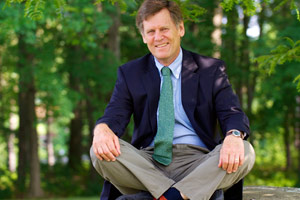Dialogues on the Environment: Q&A with Jonathan Lash
 In this ongoing series, I talk with thought leaders about ideas in my book Nature’s Fortune and trends in the environmental movement.
In this ongoing series, I talk with thought leaders about ideas in my book Nature’s Fortune and trends in the environmental movement.
Next in the series is my conversation with environmental leader and climate change and sustainability expert Jonathan Lash. Prior to becoming president of Hampshire College, Lash was president of World Resources Institute (WRI).
Mark Tercek: You had a long career in the environment, including eighteen years as President of WRI, before taking your current post as President of Hampshire College. What inspired your career shift?
Jonathan Lash: The simple answer is that Hampshire’s students inspired me. My generation is leaving a world in a precarious state. Their generation will have to address the problems of global warming, ecosystem destruction, loss of biodiversity and toxification we have created. When a friend convinced me to explore becoming President of Hampshire the students who interviewed me were smart, passionate, creative and seemingly fearless. It suddenly struck me that trying to help prepare them for the world of challenge and change they will face is the best contribution I could possibly make to the world.
Mark Tercek: Now that you’ve stepped out of day-to-day environmental work, what do you see as the biggest challenges we face?
Jonathan Lash: We have made this the “Anthropocene Era.” All the world’s natural systems are being changed by the demands of our species. Consumption driven materialism isn’t a viable survival strategy. I am convinced of the enormous capacity of human ingenuity to find means to improve human lives without destroying the Earth that all human life ultimately depends upon, but we have to decide to do so. That requires a change of cultures.
Mark Tercek: A few years ago we worked together on the US Climate Action Partnership. We hammered out a business-friendly plan that would both mitigate emissions and strengthen the economy. Although the legislation failed to make it through Congress, we got quite far. What are the takeaways from that effort? Can or should we try to revive something similar?
Jonathan Lash: Had the legislation we worked on passed, the country would be using less energy, selling more technology and producing a lot less pollution than it is today. That is why both environmental leaders and the CEOs of the country’s leading corporations supported it. The Partnership was powerful proof that Americans can work together to solve the hardest problems. The fact that having passed the House the bill could not garner sixty votes in the US Senate was a product of a brutal recession, partisanship and the Senate’s archaic rules, but it does not diminish my admiration for the leadership of those who participated, or my belief that such efforts can produce results.
Mark Tercek: Now that you are working in education, what advice do you have for harnessing the obvious energy and commitment of young people on issues like climate change?
Jonathan Lash: Hampshire College has made an aggressive commitment to reducing our GHG emissions to zero. Students are playing a key role every step of the way, as advocates, analysts and implementers. For example we have a revolving fund administered by students that invests in improved efficiency and reduced emissions around the campus. Our students are creative and entrepreneurial (a third of our alumni describe themselves as “entrepreneurs”) and we give them opportunity to engage in real problems. One alum has recently donated $1 million for students to invest in student and young alum projects.
Mark Tercek: I argue in my book Nature’s Fortune that focusing on nature as an investment opportunity can get people who may have been viewed as opponents of the environmental movement on our side, provide a source of capital and an opportunity to scale up. What risks and opportunities do you see in this approach?
Jonathan Lash: Most of the world’s people live in some form of market economy. It is perverse that markets generally attach no value to the natural systems that sustain economies. Enabling people to invest in nature can be a means of creating value, and thus incentives to sustain nature. The danger is that nature becomes a commodity with no value other than that defined by a market.
Mark Tercek: If you had my job leading TNC, what would you make your top priorities?
Jonathan Lash: TNC has one of the world’s great brands, based on visible successes, and demonstrable skills. The question is whether you can use that brand as a means to change cultural expectations and attitudes.
Jonathan Lash, the sixth President of Hampshire College, has served previously as president of World Resources Institute (WRI), Vermont Secretary of Natural Resources, Director of the Environmental Law Center at Vermont Law School, senior staff attorney of the Natural Resources Defense Council, a federal prosecutor and a Peace Corps volunteer and trainer. An internationally recognized environmental leader and an expert on climate change and sustainability, he was appointed by President Obama to the Blue Ribbon Commission on America’s Nuclear Future, chaired the President’s Council on Sustainable Development for Bill Clinton, and led Vermont’s environmental program under Governor Madeleine Kunin. He holds a law degree and master’s degree in education from Catholic University of America and a bachelor’s degree from Harvard College. President Lash has dedicated his career to building institutions to help solve the pressing problems of our planet. That dedication continues at Hampshire College, an institution committed to educating citizens who can help lead society as it confronts those problems.